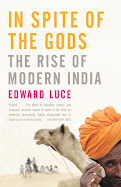-courtesy of Lalo Alcaraz
CORPORATE INTEREST → GATT → WTO → CORPORATE INTEREST
The WTO was formed in 1995 as the successor of the GATT and it its nineteen years of existence has built itself to be a global institution to be reckoned with. Nation-states developed and developing, big and small, all know the importance of belonging to the WTO, for the benefits of forming trade agreements that can help nations grow out of poverty, expand their economies, and better the standards of well being for their citizens. Trade agreements are supposedly forged in the WTO through a democratic, consensus decision-making process. On its website, the organization names among 4 qualities that a trading system should have, two of which I will address in this paper; the lack of discrimination, and more beneficial provisions for less developed countries. Despite the rapid growth in size of the organization, the WTO has been increasingly questioned in recent years on issues such the legitimacy of its affairs, the fairness of its central processes, and its overall credibility as affected by the former two factors.
One of the criticisms of the WTO is that it is a platform for hegemonic trade manipulation in favor of the large, developed, western nation-states and ignorant of the less developed ones. In proving this, my research will first establish the importance of reviewing this organization and the criticism it faces, and then define the meaning of legitimacy and fairness as they apply. Subsequently, this paper will stipulate the specific areas in which the WTO is lacking by reviewing recent and current developments as well as permanent characteristics of the organization..The thesis of this paper is that international trade agreements are skewed in favor of western nation-states and the WTO, the organization charged with multilateral, democratic negotiation falls short of accomplishing the purpose for which it was created. The ultimate goal is to propose reforms that can restore credibility to the organization in hopes of better reaching the goals for which it was created.
The self-stated purpose of the WTO is to liberalize trade, facilitate the negotiation of trade agreements, and help settle trade disputes between member countries. Based on this, a comparison can be made between the expected and realized outcomes of membership. Developing countries especially have much to gain from the WTO, and after gaining membership, have visibly attempted to implement the advice given them by the WTO. African countries for example, have heeded the advice of others to increase production of horticulture and to increase exports, but at the same time, as other developing countries have done the same, the result has been a backfire. Carol Thompson states that the simultaneous expansion of exports has led to increased quantities in the world economy and thus reduced prices for the products of developing countries, culminating in reduces revenues. This is an example of generalized advice that has been successful for developed nations and that is being given to developing nations without regard for the intricate variances respective to their economies.
A wealthier nation with a developed economy can handle a decrease in export revenues due to an influx of product on the global market, much more effectively than a poor, developing nation. The economy of a developed nation is already integrated with the global economy and has the flexibility to counter a loss of export revenues with foreign investments or the export of services, Kapoor points that that the TRIP (Trade Related aspects of Intellectual Property Rights) and TRIM (Trade Related Investment Measures) programs which are endorsed by the WTO for global investments, assume that developing countries are on the same playing field as western developed countries. It is common knowledge that western developed nations dominate the global finance and technology arena's, so there should be provisions that level the field for developing countries(535).Developing countries do not have diverse economies, so if significant efforts are directed toward manufacture and agriculture for export,, a loss of export revenue is a disastrous blow. These are the kinds of variances between WTO member nations that must be considered, before guidance is issued.
TBC..
Works Cited
Albin, Cecilia. "Using Negotiation to promote legitimacy; an assessment of proposals for reforming the WTO." International Affairs 84.4 (2008): 757-75. Print.
Drope, Jeffrey M. "The Political Econmy of Nontariff Barriers in Emerging Economies." Political Research Quarterly 60.3 (2007): 401-14. Print.
Kapoor, Ilan. "Deliberative Democracy and the WTO." Review of International Political Economy 11.3 (2004): 522-41. Print.
Rose, Andrew K. "Do we Really Know that the WTO Increases Trade?" The American Economic Review 94.1 (2004): 98-114. Print.
Satapathy, C. "Trade Sanctions and Other Barriers to Free Trade." Economic and Political Weekly 34.51 (1999): 3583-585. Print.
Thompson, Carol. "Decade of "Trade Not Aid"" Review of African Political Econonomy 30.96 (2003): 321-23. Print.








No comments:
Post a Comment